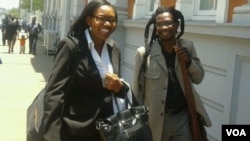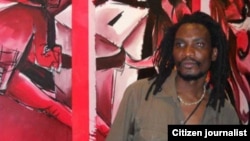The Constitutional Court on Wednesday declared that a section of the Criminal Law (Codification and Reform) Act which prohibits the publication of falsehoods, contravenes the fundamental right to freedom of expression as enshrined in Zimbabwe’s constitution.
In a ruling following a constitutional challenge by the then Independent newspaper editor, Constantine Chimakure, the court ruled that Section 31(a) 111 of the Criminal Law (Codification and Reform) Act contravened Section 20 (1) of the Constitution.
Section 31 of the Criminal Law Act prohibits the publication or communication of false statements with the intention or risk of undermining confidence in the law enforcement agency, Prison Service or Defence Forces of Zimbabwe.
Chimakure was jointly charged with Alpha Media Group Editor-in-Chief Vincent Kahiya and Zimbabwe Independent publishers after publishing a story that law enforcement agencies had abducted human rights activists including Jestina Mukoko in 2008.
In his judgment, the Deputy Chief Justice Luke Malaba said the section was draconian and unconstitutional.
He ordered the Minister of Justice, Emmerson Mnangangwa, to appear before the court to show cause why the section should not declared unconstitutional.
In respect of artist, Owen Maseko, who was arrested and charged with contravening sections 31 and 33 of the same piece of legislation, the court found that the section was unconstitutional.
Mr. Mnangagwa was also ordered to appear before the same court on November 20 to show cause why the legislation should not be struck off the country’s statutes.
Maseko was arrested and charged in March 2010 for staging an exhibition in Bulawayo depicting the 1980s Matabeleland massacres, carried out by a crack military unit – the Five Brigade, which was trained by North Koreans.
More than 20,000 people aligned to the PF Zapu leader Joshua Nkomo are believed to have been killed by the brigade in Matabeleland and the Midlands provinces.
Maseko was accused of undermining the authority of or insulting the president and offending people of other races and or religions.
His pieces of art depicted the Gukurahundi atrocities, which were once described by Mugabe as a moment of madness.
Meanwhile, in another case in which a Bulawayo man, Tendai Danga, who was challenging the constitutionality of the same law, was withdrawn by consent after defense and state attorney agreed that he should not have been charged in the first place.
Danga was arrested in Northend suburb of Bulawayo after he insulted a policeman and President Mugabe.
Justice Malaba said police should stop dragging the name of the president over superfluous allegations made in beer halls.
He said by doing so the police were actually insulting the president.
In a ruling following a constitutional challenge by the then Independent newspaper editor, Constantine Chimakure, the court ruled that Section 31(a) 111 of the Criminal Law (Codification and Reform) Act contravened Section 20 (1) of the Constitution.
Section 31 of the Criminal Law Act prohibits the publication or communication of false statements with the intention or risk of undermining confidence in the law enforcement agency, Prison Service or Defence Forces of Zimbabwe.
Chimakure was jointly charged with Alpha Media Group Editor-in-Chief Vincent Kahiya and Zimbabwe Independent publishers after publishing a story that law enforcement agencies had abducted human rights activists including Jestina Mukoko in 2008.
In his judgment, the Deputy Chief Justice Luke Malaba said the section was draconian and unconstitutional.
He ordered the Minister of Justice, Emmerson Mnangangwa, to appear before the court to show cause why the section should not declared unconstitutional.
In respect of artist, Owen Maseko, who was arrested and charged with contravening sections 31 and 33 of the same piece of legislation, the court found that the section was unconstitutional.
Mr. Mnangagwa was also ordered to appear before the same court on November 20 to show cause why the legislation should not be struck off the country’s statutes.
Maseko was arrested and charged in March 2010 for staging an exhibition in Bulawayo depicting the 1980s Matabeleland massacres, carried out by a crack military unit – the Five Brigade, which was trained by North Koreans.
More than 20,000 people aligned to the PF Zapu leader Joshua Nkomo are believed to have been killed by the brigade in Matabeleland and the Midlands provinces.
Maseko was accused of undermining the authority of or insulting the president and offending people of other races and or religions.
His pieces of art depicted the Gukurahundi atrocities, which were once described by Mugabe as a moment of madness.
Meanwhile, in another case in which a Bulawayo man, Tendai Danga, who was challenging the constitutionality of the same law, was withdrawn by consent after defense and state attorney agreed that he should not have been charged in the first place.
Danga was arrested in Northend suburb of Bulawayo after he insulted a policeman and President Mugabe.
Justice Malaba said police should stop dragging the name of the president over superfluous allegations made in beer halls.
He said by doing so the police were actually insulting the president.





